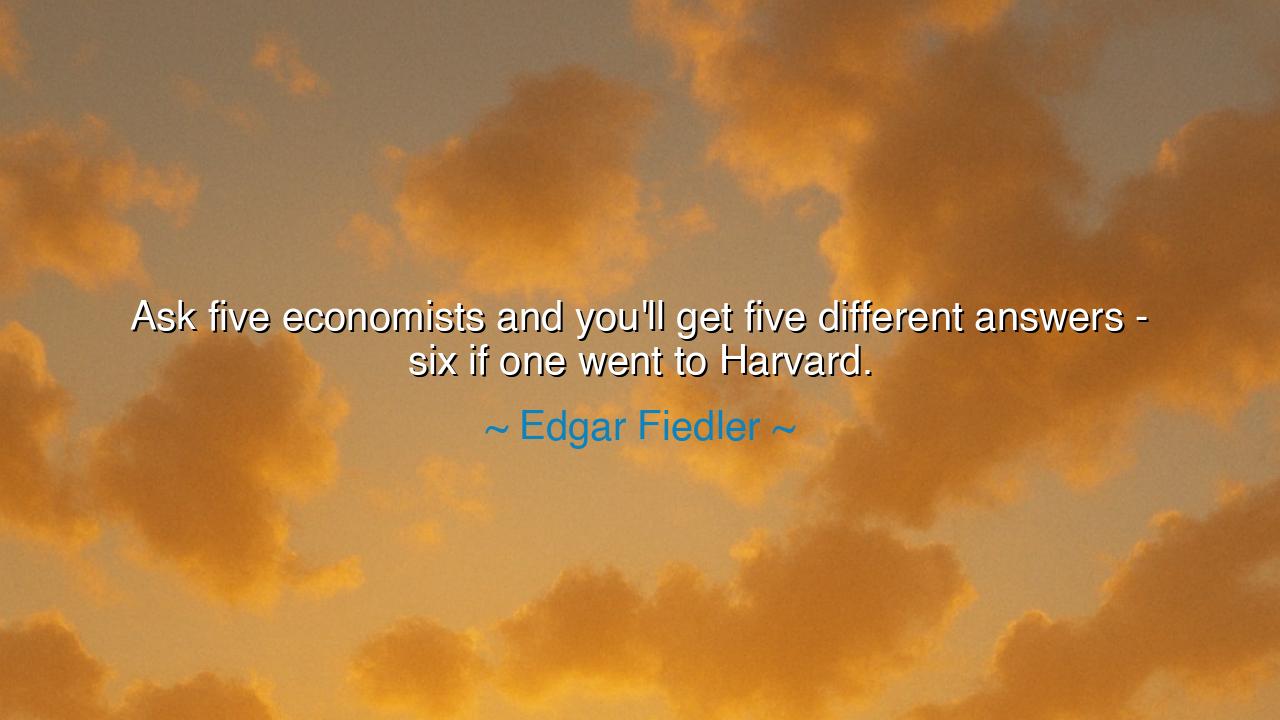
Ask five economists and you'll get five different answers - six
Ask five economists and you'll get five different answers - six if one went to Harvard.






Host: The room was quiet, the evening light casting long shadows across the table. Jack sat with a bemused expression, looking down at his phone. Jeeny, sitting across from him, noticed the hint of a smile on his face and leaned forward, clearly curious about what had caught his attention.
Jeeny: (playfully) “You look like you’ve found something amusing. What’s on your mind?”
Jack: (grinning) “I just came across a quote from Edgar Fiedler. He said, ‘Ask five economists and you'll get five different answers - six if one went to Harvard.’ It made me laugh, but it also got me thinking about how even within fields that are supposed to be based on data and analysis, there’s still so much subjectivity and interpretation.”
Host: Jeeny chuckles softly, clearly entertained by the humor in the quote. She leans back slightly, her fingers lightly tracing the rim of her cup.
Jeeny: “It’s so true, isn’t it? Economists, of all people, should have a clear answer, but it just goes to show how different perspectives, biases, and even educational backgrounds shape the way we approach problems. Even with all the data in the world, we’re still influenced by our own experiences and interpretations.”
Jack: (nodding) “Exactly. It’s funny, but also a little humbling. It’s like Fiedler is pointing out that even when we think we’re seeking objective answers, the very nature of human interpretation means that answers will always vary. It’s all about perspective — even in fields where we expect clear-cut solutions.”
Host: The room grows quieter, as Jeeny reflects on the deeper meaning behind Fiedler’s humorous observation. The conversation shifts toward the complexity of knowledge and the way subjectivity always plays a role, even in the most data-driven fields.
Jeeny: “It’s almost like we have this illusion that experts should have definitive answers, but when you get into something like economics, where there are so many variables and moving parts, it’s more about understanding different viewpoints than finding one right answer. Everyone’s got their own lens through which they see the world.”
Jack: (thoughtfully) “Yeah, and that’s the beauty of it. No one person can hold the truth in its entirety. It’s about learning to navigate these differing viewpoints, knowing that even the most educated experts can have contrasting opinions. It’s not about who’s right, but about understanding the different angles.”
Host: Jeeny smiles softly, her fingers curling around her cup. The quiet understanding between them grows deeper — that even the most objective fields are influenced by perspective, and the search for truth is often a journey of engaging with multiple viewpoints, not simply finding a singular answer.
Jeeny: “I think that’s the challenge we face in any field, really. The more we dig into something, the more we realize how complex it is, and how much context and background influence how we interpret the world. Whether it’s economics or anything else, we have to be open to seeing things from different perspectives.”
Jack: (grinning) “Exactly. It’s all about the conversation, the dialogue between different ideas and approaches. That’s where the true understanding comes in, even if we don’t always agree on the answers.”
Host: The room feels a little lighter now, as if the humor in Fiedler’s words has opened a window into a deeper understanding of knowledge, subjectivity, and the nature of expertise. The realization that even the most data-driven fields are shaped by perspective and interpretation leaves a sense of peace — and a reminder that sometimes, the value lies in the conversation, not the answer.






AAdministratorAdministrator
Welcome, honored guests. Please leave a comment, we will respond soon